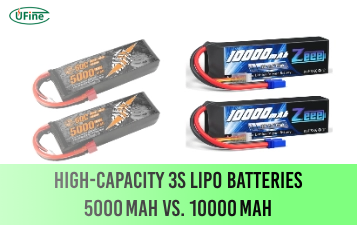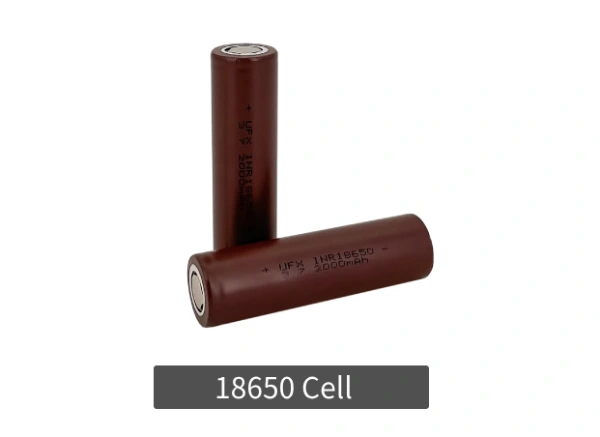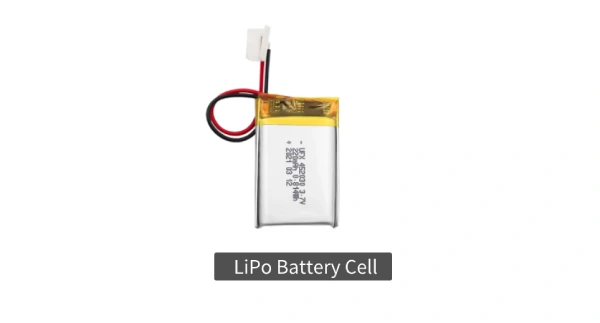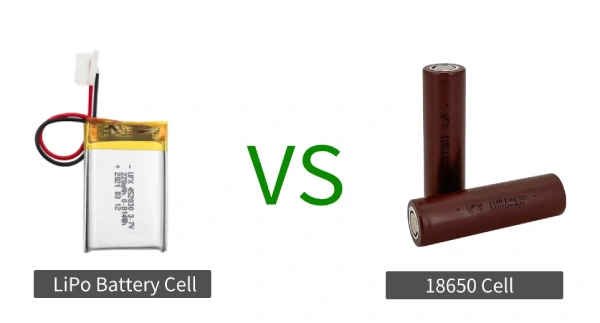LiPo cell and 18650 cell are both lithium-ion cells. So what’s the difference between them? Which cell is better? This article will introduce the similarities and differences between LiPo cell and 18650 cell in battery structure, cycle life, safety, and how to choose the best battery for your application. Whether you’re building a drone, an electric vehicle, or a custom battery pack, you’ll find useful insights to guide your decision-making process.
Part 1. What is an 18650 cell?
Understanding the 18650 Battery
The 18650 cell is a type of lithium-ion battery, widely known for its cylindrical shape and commonly used in everything from laptops to electric vehicles. The name “18650” refers to the cell’s dimensions: 18mm in diameter and 65mm in length. These cells are incredibly popular due to their high energy density, affordability, and long-lasting performance.
Key Features of 18650 Cells:
- Voltage: Nominal voltage of 3.7V.
- Capacity: Ranges from 1500mAh to 3500mAh.
- Energy Density: High energy density, suitable for a variety of applications.
- Cycle Life: Up to 1000 charge cycles or more with proper maintenance.
- Durability: Known for their robustness and longevity in various devices.
Advantages of 18650 Cells:
- Affordable: More cost-effective compared to other lithium battery options, especially in bulk.
- Availability: Easily available and commonly used in many devices, which makes replacement simple.
- Longevity: Offers excellent lifespan, typically providing many years of reliable use if maintained properly.
However, while 18650 cells offer numerous advantages, they can be bulky and require additional assembly into battery packs for larger applications, which can complicate designs for compact devices.
Part 2. What is a LiPo battery cell?
Understanding the LiPo Battery
LiPo (Lithium Polymer) batteries are a type of rechargeable battery that uses a polymer electrolyte instead of a liquid one. These batteries are highly versatile, offering various shapes and sizes, which makes them ideal for applications where space is limited. You will often find LiPo cells used in drones, remote-controlled vehicles, and wearable electronics.
Key Features of LiPo Cells:
- Voltage: Typically 3.7V per cell, with multi-cell configurations offering higher voltages (e.g., 7.4V, 11.1V).
- Capacity: Varies from 100mAh to several thousand mAh.
- Flexibility in Shape: Can be molded into various shapes and sizes, perfect for compact devices.
- Lightweight: LiPo batteries are generally lighter than other types of lithium-ion batteries, making them ideal for weight-sensitive applications.
- Discharge Rate: Known for high discharge rates, ideal for high-power applications.
Advantages of LiPo Cells:
- Customizable: Available in flexible shapes, allowing for integration into tight spaces where other batteries may not fit.
- High Discharge Rate: Capable of providing a quick burst of power, making them suitable for applications like drones, RC cars, and high-performance devices.
- Lightweight: LiPo batteries tend to weigh less than 18650 cells, making them ideal for applications where weight is a crucial factor.
However, LiPo batteries come with safety concerns. They are more sensitive to mishandling, such as overcharging, over-discharging, or exposure to extreme temperatures, which can lead to swelling or even fire.
Part 3. 18650 vs Lipo:What is the difference between a lipo and an 18650 cell?
1. Cycle life
The standard 18650 type A cell has a cycle life of about 500 times. Even the cycle life of a specially improved 18650 cell does not exceed 800 times. The Lipo cell can be charged and discharged more than 800 times. Some good quality lipo cells can be charged and discharged up to 1,200 times.
2. Convenience
The portability of a battery mainly refers to two aspects, namely weight and volume.
Both of these points are inseparable from battery energy density. Before comparison, it is necessary to distinguish between a single cell’s energy density and a battery pack’s energy density.
Regarding the energy density of a single cell, the 18650 cell is higher than the lipo cell. At the battery pack level, the energy density of the two is almost the same. However, lipo cells can make products appear thinner and have more diverse appearances.
3. safety
Compared with the 18650 cells, the lipo cell is thinner and more beautiful. However, lipo cells have not actually received much improvement in terms of safety.
Distinguish between cylindrical 18650 cells and lipo cells in terms of shape. Lipo cells are far from mature, and even lipo cells are not uniform in size, size, pole position, etc.
The production processes possessed by many battery manufacturers cannot meet the production conditions of lipo cells. Most battery manufacturers still rely on human control to produce lipo cells. The consistency of lipo cells cannot reach the level of 18650 cells. On the contrary, the 18650 cell
| Feature | 18650 Cell | LiPo Cell |
|---|---|---|
| Energy Density | High energy density, ideal for long-lasting power | Generally lower energy density than 18650, but still good for most applications |
| Size & Shape | Cylindrical, not as flexible | Flexible shapes, ideal for compact designs |
| Weight | Heavier compared to LiPo | Lighter, better for weight-sensitive devices |
| Discharge Rate | Moderate discharge rate | High discharge rate, suitable for high-power needs |
| Cycle Life | Longer cycle life (500-1000 cycles) | Shorter cycle life (300-500 cycles) |
| Safety | Built-in protection, relatively safer | More prone to swelling or explosion if mishandled |
| Price | Generally more affordable | More expensive due to flexibility and performance |
As you can see, each type has its strengths. 18650 cells are ideal for long-lasting power and cost-effective solutions, while LiPo cells excel in high-power applications where size and weight are critical.
Part 4. How to choose between 18650 and LiPo cells?
Choosing between 18650 cells and LiPo batteries depends on your specific requirements. Here’s a guide to help you decide:
- Application: If you need a battery for a drone or remote-controlled vehicle, where weight and space are critical, LiPo is the best option. On the other hand, for power tools, electric vehicles, or larger battery packs, 18650 cells are more suitable due to their energy density and longer life.
- Size: If you have a compact or customized space, LiPo cells are the better choice, as they can be molded to fit specific shapes.
- Power Needs: For high-discharge applications, such as drones or racing RC cars, LiPo cells deliver the needed burst of power. For continuous, stable power, 18650 cells provide better performance.
- Budget: If cost is a concern, 18650 cells are generally cheaper, especially in bulk, while LiPo cells are more expensive due to their versatility and performance.
Contact Ufine Battery for Customized Solutions
At Ufine Battery, we specialize in providing customized lithium-ion solutions tailored to your specific needs. Whether you need 18650 cells, LiPo batteries, or even LiFePO4 batteries, we can design the perfect battery pack for your application. With over 17 years of experience in the industry, Ufine Battery can help you find the optimal battery solution at a competitive price. Contact us today to get a quote or learn more about our services!
Part 5. Why do LiPo cells and 18650 cells explode?
Both 18650 cells and LiPo batteries are generally safe when used correctly, but improper handling can lead to dangerous outcomes such as fires or explosions. Some common causes include:
- Overcharging: Overcharging can cause internal pressure to build up, leading to swelling and potential rupture.
- Short Circuits: A short circuit can cause rapid overheating, making the battery unstable.
- Mishandling: Dropping or puncturing the battery can cause it to fail, especially with LiPo cells, which are more fragile.
- Overheating: Exposure to high temperatures can cause a battery to swell, leak, or even explode.
To minimize these risks, always use the correct charger and follow the manufacturer’s instructions carefully.
Part 6. How to use LiPo and 18650 cells correctly?
To ensure longevity and safety, it’s essential to handle both 18650 cells and LiPo batteries properly:
- Use a Quality Charger: Always use a charger that matches your battery type to avoid overcharging.
- Storage: Store batteries in a cool, dry place, and avoid exposure to extreme temperatures.
- Monitor Battery Health: Regularly check the voltage and temperature of the battery during use to avoid any overheating issues.
Part 7. Final words
Choosing between 18650 cells and LiPo batteries largely depends on your specific application needs. If you require a longer lifespan, higher energy density, and a more cost-effective solution, 18650 cells are the way to go. However, if your project requires a lightweight, compact design and high discharge rates, LiPo batteries might be the best choice.
For custom battery solutions, whether 18650, LiPo, or other types, reach out to Ufine Battery for expert guidance and top-quality products. Contact us for your customized lithium battery solution today!
Part 8. FAQs
-
Can I use a LiPo battery in a device designed for 18650 cells?
While it may be possible, it’s not recommended unless the LiPo battery is properly sized and designed for that specific application. Always check the voltage and discharge requirements. -
How long do 18650 cells last?
With proper care, 18650 cells can last between 3 and 5 years, depending on usage and charging habits. -
Are LiPo batteries safer than 18650 cells?
18650 cells are generally considered safer than LiPo batteries, which are more prone to swelling and damage if mishandled.
Related Tags:
More Articles

High‑Capacity 3S LiPo Batteries: 5000 mAh vs. 10000 mAh
Compare 3S LiPo 5000mAh vs 10000mAh batteries by weight, power, and use. Find the best fit for your drone, RC car, or boat setup.
Top 5 Applications for Small 3S LiPo Batteries
Small 3S LiPo batteries power drones, RC gear, wearables, and robotics with high energy and low weight. Making them ideal for compact electronics projects.
Building and Charging Your Own 3S LiPo Pack: A Step‑by‑Step Guide
Learn how to build, balance, and charge a 3S LiPo battery pack safely at home with this complete DIY guide for hobbyists and beginners.
How to Choose the Right LiPo Battery Plug Type?
Discover the best LiPo battery plug types, how to choose them, and expert tips for safe usage, soldering, and maintenance.
Choosing the Right Connector for Your 3S LiPo Battery
Choosing the right 3S LiPo connector depends on current, space, and use. Learn the pros and cons of XT60, JST, EC3, and more.






